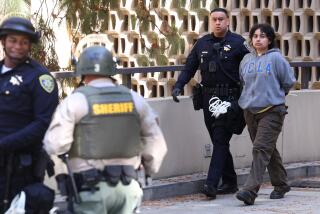Opinion: USC got it wrong in canceling valedictorian’s speech. Here’s what the school should do now

USC’s decision to rescind valedictorian Asna Tabassum’s invitation to speak at its commencement no doubt resulted from a range of pressures from inside and outside the university, particularly the outcry over the student’s expressions of support for Palestinians. Provost Andrew T. Guzman wrote that he acted in the face of “substantial risks relating to security and disruption at commencement.”
Particularly since Oct. 7, university administrators have tough jobs requiring them to balance commitments to free speech, a vibrant and respectful academic culture, and campus safety. That said, USC made the wrong decision.
University officials evidently calculated that they would prefer taking heat for canceling Tabassum’s speech to doing what they have done for over a century: giving the valedictorian the opportunity to share her insights with the USC community.
Complaints of antisemitism and Islamophobia on campus have skyrocketed. Figuring out when speech is protected or violating the rights of others is no easy task.
What exactly was the risk of abiding by this valuable and time-honored tradition? After all, U.S. presidents are invited to give commencement addresses at universities every year, necessitating far more security than any other speaker. Surely the threats posed to Tabassum can’t be graver than those facing a president of the United States.
Could it be that the risks motivating administrators included the prospect that the valedictorian might criticize Israel’s war in Gaza or express sympathy for the Palestinian people? If so, their tolerance for voices that roil the establishment has sadly disappeared.
We will not move past the crisis of the moment by silencing those with whom we disagree. The university is exactly the sort of place where such views must be heard. Otherwise, it is not a university.
Recent incidents at SUNY Albany, Stanford Law School and Cornell show students confusing censorship for legitimate protest.
Universities should resist the toxic political culture that locks us in our echo chambers, where we are exposed only to those views that are to our liking. Students shouldn’t become passive followers who seek a diploma just to get a job. We want and need our students to be leaders; they need to encounter divergent and challenging perspectives that allow for innovation and the production of knowledge that can serve society.
An important point is often lost in the shrillness of public debate: It is legitimate to call for the liberation of Palestinians who have been deprived of the right of self-determination — which is precisely what Israel represents for Jews — since 1948, even if reasonable people can disagree about how that should be achieved. It is also legitimate to express grave concern about a war that has killed more than 33,000 people, many of them children, and displaced most of the Gaza Strip’s population.
These arguments are deeply discomfiting to many, especially students, staff and faculty who identify with Israel. And if the valedictorian were to articulate these claims in her commencement speech, it would be uncomfortable for some, perhaps many. But controversy is hardly unheard of or inappropriate in commencement addresses and decisions about who delivers them.
Graduation speakers have seized the pulpit to speak truth to power during some of the most tumultuous times in our country. At Vassar College’s 1970 commencement ceremony, it was probably uncomfortable for many in the audience, particularly the men, when Gloria Steinem declared that “much of the trouble this country is in has to do with the Masculine Mystique: the idea that manhood somehow depends on the subjugation of other people.” And many in the audience of UC Berkeley’s 1966 law school commencement were likely uncomfortable when valedictorian Michael Tigar devoted his speech to Vietnam, proclaiming: “War is the enemy of political freedom.”
But given the tedium that so often characterizes commencement speeches, controversial ones may be more in line with the rightful function of universities.
It is not too late for USC to correct its error. It would do justice to Tabassum, who is by all accounts an exceptional, passionate and compassionate student. And it would demonstrate confidence in the university as a forum that can withstand — and even benefit from — controversial and challenging speech.
David N. Myers is distinguished professor of Jewish history at UCLA. Salam Al-Marayati is the president of the Muslim Public Affairs Council.
More to Read
A cure for the common opinion
Get thought-provoking perspectives with our weekly newsletter.
You may occasionally receive promotional content from the Los Angeles Times.












